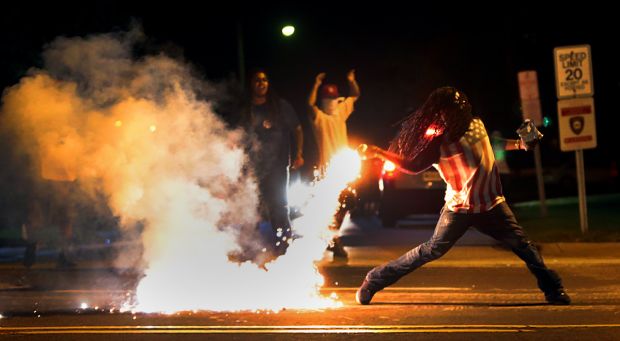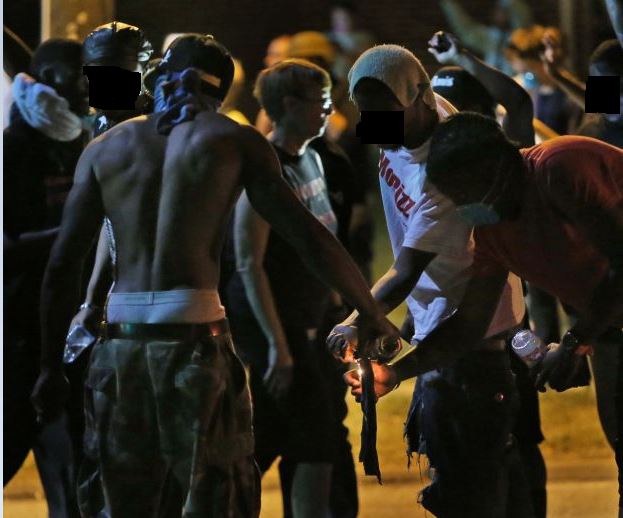 1. What happened to Mike Brown is a tragedy that can’t be put into words. A less spoken tragedy is that it’s the day to day reality for so many of us–especially those of us who are young, who are people of color, who don’t fit the cops’ idea of an acceptable, law abiding citizen. How often do the police kill someone? In St. Louis, it seems like almost every month. We often don’t do anything about it, or feel like we can. The last few days have been different.
1. What happened to Mike Brown is a tragedy that can’t be put into words. A less spoken tragedy is that it’s the day to day reality for so many of us–especially those of us who are young, who are people of color, who don’t fit the cops’ idea of an acceptable, law abiding citizen. How often do the police kill someone? In St. Louis, it seems like almost every month. We often don’t do anything about it, or feel like we can. The last few days have been different.
2. People in Ferguson have shown–through gathering, talking and debating with each other, protesting and rioting– that this tragedy won’t be yet another one placed on our already over-burdened backs.
3. Day to day, we don’t have a voice. Working people, people of color, poor people, the disenfranchised – we don’t have an official media that will argue our interests like the rich and middle class. We don’t have a police force we can call like the middle class or an army like the rich. We only have each other. Large protests and rioting gives us a voice, gives us power. These actions let us take back some of our dignity.
4. The 1960s saw many urban uprisings: riots and looting where fed-up, voiceless people were able to have a voice and, for once, the nice things that are constantly kept out of our reach. One of the police and government’s biggest fears is that people will realize we don’t need them and their mentality.
5. In response to the urban uprisings of the ‘60s, police developed a two-fold strategy. First, that police from then on would have counter-insurgency training, gear and weaponry, and would use it as their day to day way of patrolling neighborhoods where poor people and people of color live. We see the effects of this constantly: getting pulled over not by one cop but 3-5 cars worth, having ourselves groped, our shoes taken off, having the doors of our homes kicked in.
The second way police began this new era of policing was by making sure protests were over before they started: forming relationships with “community leaders” and making sure that when there are moments of power (large protests, riots) the community figures (clergy, celebrities, media) call for calm. Police try to get protesters to come forward to denounce protesters, take leadership positions, and start policing the rest of us. Police can handle a dozen or so leaders, they can’t control a street of 1000+ people. If you’re advocating these tactics, remember, so are the police.
6. These two sentiments are so common now, most clergy, family members of the slain, and media will call for calm before being officially asked to by police. The flip side to calls for calm is: who’s brave enough to get on the news and calling for rioting? Remember: it’s legal to denounce rioting and illegal to call for it, which is why we only hear about how bad it is, even though many of us know differently.
7. The law and the courts are cobwebs for the rich that they can brush off and chains and shackles for the rest of us, a continuation of the legacy of slavery. The justice system is not broken, this is how it’s supposed to work. This country was founded on genocide, slavery and exploitation – the judicial system has always reflected that. There are more people locked up and on parole and probation now then there were slaves in 1850. Working with the police and with the government to get justice for Mike Mike is a cul-de-sac – a dead-end intentionally created to destroy our energy and take power away from us again. “Fool me once, shame on you. Fool me twice, shame on me” as the saying goes.
8. The only time the law serves us is when we put so much pressure on the system as a whole, that they’re forced to sacrifice one part of themselves to save the rest. Normally, nothing happens to killer cops other than paid leave, but if people refuse to accept it (protests, riots) then those in power are forced to sacrifice one officer to protect the image of the police and the city government in general. The riots after Martin Luther King Jr. was shot, the Oscar Grant riots that lead to the killer cop going to prison, show the power, strength and honor of large gatherings, of protests, of rioting.
Even if the calls for calm are genuine, they’re wrong. If you look at cases where people calmly marched on the sidewalk, politely asking the very people murdering us to do something about the murders versus times when people have had large uncontrolled protests and riots, almost only the riots have gotten convictions. Or more specifically, times when protesters used all tactics – rioting among them.
9. Whether of not you agree with those who want to have power and a voice outside of walking on the sidewalk, and listening to clergy and politicians, don’t publicly denounce individuals. You’re putting whoever you denounce at great personal risk. You’re giving information to the police (snitching) and you’re putting people into the police’s hands. Have you forgotten what it’s like to be in their grip? How can you – in the name of justice against the police and for the victims of the police – turn innocent or guilty people over to them? If we disagree, let’s talk about it, put let’s not ever use the police to solve our problems. As we know, the police only lead to more violence and more repression, not justice.
10. This is about race. With the legacy of slavery (did it every really end?), racialized poverty and the prison system, how could it not be? One way to confront racism is to stick together and attack the sources of racialized violence: the police, the prison system, etc. Let’s keep our anger, our words, our rocks and our scopes aimed at the enemy, not each other. Let’s keep this from becoming black vs. black, black vs. white, etc, but instead people vs. the police, people vs. the city government: the haves vs. the have-nots. People vs. those who have the power to jail, beat and murder black people or any people on the streets of our cities.
11. Look out for each other? Yes. Become police? No. The tear-gas firing, rubber-bullet shooting officer has the same effect as the calm, neon vest-wearing former protester turned protest marshall/ peace police who forces their fellow protesters back on the sidewalk. Both (consciously or not) stop us. Both try and take away our voice, reduce us to 2-deminsional sound bites, and claim to know what’s best for everyone. Both police and protest marshalls don’t see us as people but as sheep. Don’t respect those trying to take over everything: if no one leads, we all lead. If 1-20 people lead, only 1-20 people have a voice.
Are greatest strength is everyone learning how to think about this situation for themselves and help each other figure out how to talk about what we’re experiencing, act on ideas and beliefs as well as our emotions. Don’t become the police – refuse to wear the neon vests. Don’t police each other – let us all express ourselves. Don’t respect the handful of people who are trying to take this away from all of us by becoming the police and by appointing themselves the leaders. Don’t let them turn you back into sheep.

[…] of Ferguson has come from the Anti-State St Louis folk; An Eye For An Eye Makes Our Masters Blind, Let Us Not Become Police, Let Us Not Become Sheep and Ferguson Over One Week In are all pretty much essential […]
i know. the police really only have about 3 or 4 plays and it’s mind boggling that not everyone can see “Good Cop/ Bad Cop” being played when they see it. A lot of people on the ground can, though.
fucking brilliant!
its a shame it looks like the anger has largely been placated by replacing one police force (stl county) with another (mo highway patrol). now we can all hug and be happy. we have justice…yeah we shall see about that when the verdict comes down.